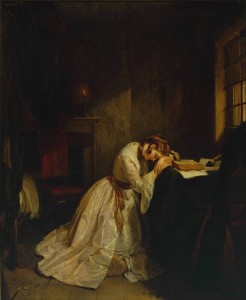THE WILL
I, CLARISSA HARLOWE, now, by strange melancholy accidents, lodging in the parish of St. Paul, Covent-garden, being of sound and perfect mind and memory, as I hope these presents, drawn up by myself, and written with my own hand, will testify, do, [this second day of September,*] in the year of our Lord ——,** make and publish this my last will and testament, in manner and form following:
In the first place, I desire that my body may lie unburied three days after my decease, or till the pleasure of my father be known concerning it. But the occasion of my death not admitting of doubt, I will not, on any account that it be opened; and it is my desire, that it shall not be touched but by those of my own sex.
…
I have already given verbal directions, that, after I am dead, (and laid out in the manner I have ordered,) I may be put into my coffin as soon as possible: it is my desire, that I may not be unnecessarily exposed to the view of anybody; except any of my relations should vouchsafe, for the last time, to look upon me.
And I could wish, if it might be avoided without making ill will between Mr. Lovelace and my executor, that the former might not be permitted to see my corpse. But if, as he is a man very uncontrollable, and as I am nobody’s, he insist upon viewing her dead, whom he ONCE before saw in a manner dead, let his gay curiosity be gratified. Let him behold, and triumph over the wretched remains of one who has been made a victim to his barbarous perfidy: but let some good person, as by my desire, give him a paper, whist he is viewing the ghastly spectacle, containing these few words only,—’Gay, cruel heart! behold here the remains of the once ruined, yet now happy, Clarissa Harlowe!—See what thou thyself must quickly be;—and REPENT!—’
Yet, to show that I die in perfect charity with all the world, I do most sincerely forgive Mr. Lovelace the wrongs he has done me.
Continue reading →
